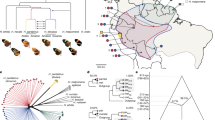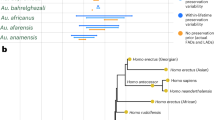Abstract
MECHANISMS producing and maintaining discrete polymorphisms have long fascinated evolutionary biologists1,2. Despite the ubiquity of non-sex-limited polymorphisms in vertebrates, the evolutionary factors maintaining them are well understood in only a few instances3. The African finch Pyrenestes is unique among birds in exhibiting a non-sex-determined polymorphism in bill size4,5. Morphs breed randomly with respect to bill size and differ in diet and feeding performance on soft and hard seeds4,6. I present here: (1) new data showing that the polymorphism appears to result from a single genetic factor; (2) support from long-term field studies for earlier suggestions that disruptive selection is acting on bill size; and (3) data revealing the presence of a possible third, much larger morph. Results suggest that the polymorphism may have arisen through single mutations, where morphs occupy distinct adaptive peaks through differences in feeding performance on seeds differing in hardness.
This is a preview of subscription content, access via your institution
Access options
Subscribe to this journal
Receive 51 print issues and online access
$199.00 per year
only $3.90 per issue
Buy this article
- Purchase on Springer Link
- Instant access to full article PDF
Prices may be subject to local taxes which are calculated during checkout
Similar content being viewed by others
References
Mayr, E. Animal Species and Evolution (Harvard Univ. Press, Cambridge, 1963).
Thoday, J. M. Nature 181, 112 (1958).
Futuyma, D. J. Evolutionary Biology (Sinauer, Sunderland, MA, 1986).
Smith, T. B. Nature 329, 717–719 (1987).
Smith, T. B. Biol. J. Linn. Soc. 41, 381–414 (1990).
Smith, T. B. Ecology 71, 1246–1257 (1990).
Smith, T. B. Oikos 60, 76–82 (1991).
Smith, T. B. Evolution 44, 832–842 (1990).
Schluter, D. Evolution 42, 849–861 (1988).
Smith, T. B., Frampton, T. & Seibels, R. Proc. 1990 Regional AAZPA (1990).
Smith, T. B. Proc. 8th Pan-African Ornithological Congr. (Bujumbura, Burundi, in the press).
Orr, H. A. & Coyne, J. A. Am. Nat 140, 725–742 (1992).
Charlesworth, B. & Charlesworth, D. J. theor. Biol. 55, 305–324 (1975).
West-Eberhard, M. J. Proc. natn. Acad. Sci. U.S.A. 83, 1388–1392 (1986).
Mayr, E. The Growth of Biological Thought (Harvard Univ. Press, Cambridge, 1982).
Fisher, R. A. The Genetical Theory of Natural Selection (Dover, New York, 1958).
Falconer, D. S. Introduction to Quantitative Genetics (Longman, London, 1981).
Meyer, A. Oecologia 80, 431–436 (1989).
Author information
Authors and Affiliations
Rights and permissions
About this article
Cite this article
Smith, T. Disruptive selection and the genetic basis of bill size polymorphism in the African finch Pyrenestes. Nature 363, 618–620 (1993). https://doi.org/10.1038/363618a0
Received:
Accepted:
Issue Date:
DOI: https://doi.org/10.1038/363618a0
This article is cited by
-
Shaping up? A direct comparison between 2D and low-cost 3D shape analysis using African cichlid mandibles
Environmental Biology of Fishes (2019)
-
Growth factor gene IGF1 is associated with bill size in the black-bellied seedcracker Pyrenestes ostrinus
Nature Communications (2018)
-
Queen size dimorphism in social insects
Insectes Sociaux (2016)
-
The occurrence of two bill morphs of prions Pachyptila vittata on Gough Island
Polar Biology (2014)
-
Quantitative genetic analysis of subspecific differences in body shape in the snail-feeding carabid beetle Damaster blaptoides
Heredity (2013)
Comments
By submitting a comment you agree to abide by our Terms and Community Guidelines. If you find something abusive or that does not comply with our terms or guidelines please flag it as inappropriate.



